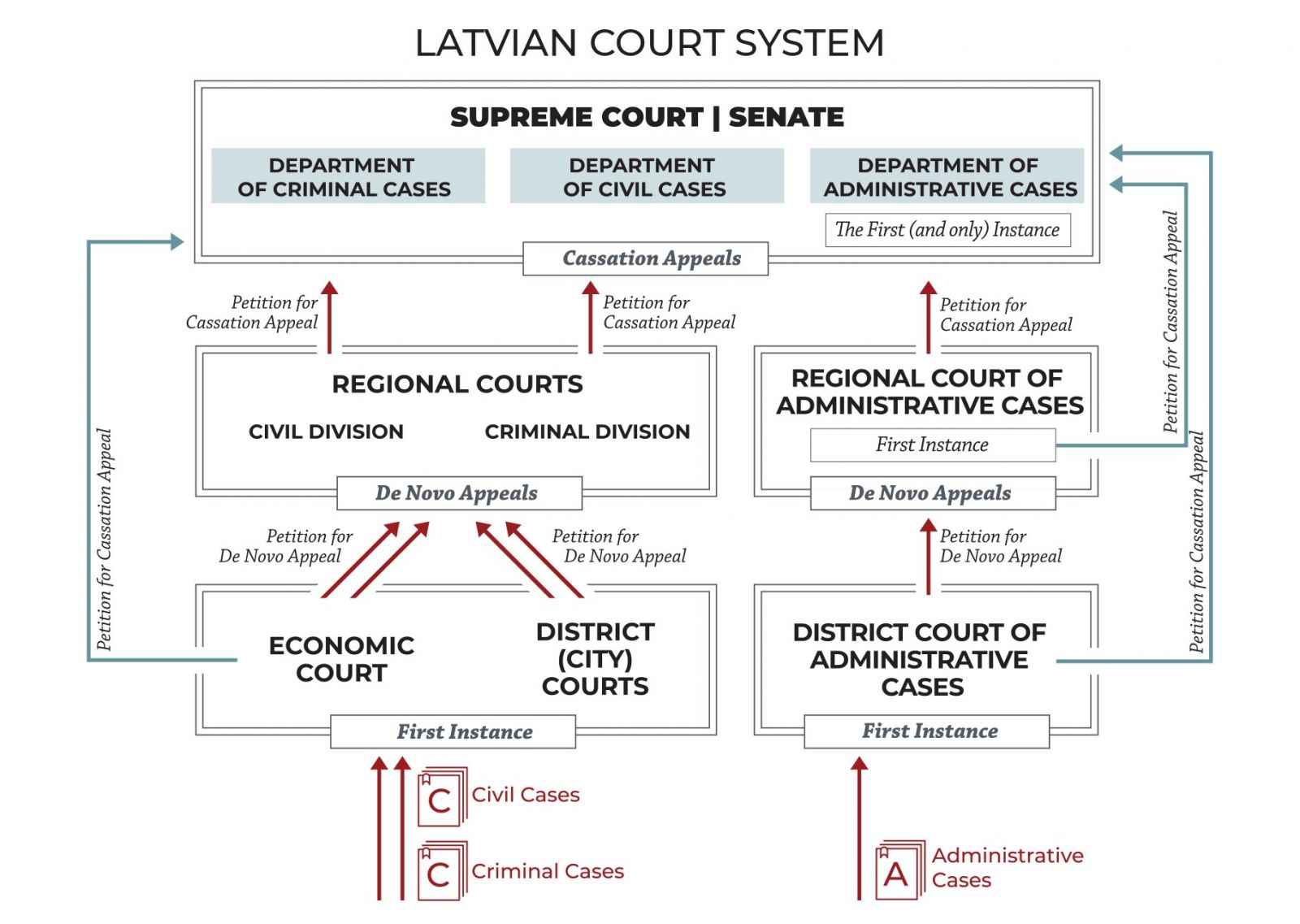
A three-instance court system has been established in Latvia – cases are heard at the court of first instance, court of appellate instance and cassation instance (in some cases the legislator has defined exemptions to this procedure).
Cassation
Cassation (Latin, cassation – disaffirmation) involves examining rule of law of a judgment or a decision of a lower instance court. A cassation instance does not review a case on its merits; its competence does not include clarifying the facts of the case and examining and evaluating evidence. The cassation instance examines conformity of a judgment appealed with provisions of substantive and procedural law and decides on the basis of relevant case materials. Judgements and decisions by cassation instance may not be appealed.
The cassation instance is the Department of Civil Cases, the Department of Criminal Cases and the Department of Administrative Cases of the Senate.
Departments of the Senate review cassation complaints and protests in civil cases and criminal cases against decisions in cases heard under appellate procedure.
The Department of Administrative Cases hears also cassation complaints and protests against decisions adopted by first instance courts (in some categories of cases the Administrative Regional Court is the first instance court).
In 2018 the Supreme Court examined 2817 cases under cassation procedure, among which there were 1388 civil cases, 668 criminal cases and 761 administrative case examined.
Composition of a judicial panel
The Senate’s departments review cases in a collegial manner by a panel consisting of three judges. In cases provided for in the Civil Procedure Law, the case shall be heard by an extended composition of the Department of Civil Cases, and in cases provided by the Administrative Procedure Law – in the joint sitting of the Department of Administrative Cases. The Criminal Procedure Law provides that the prosecutor's opinion and the materials submitted on newly discovered circumstances in cases decided by the Department of Criminal Cases are reviewed by five senators who have not previously participated in the review of the particular criminal case.
Security deposit
No security deposit shall be paid when filing a cassation complaint in a criminal case. Security deposit shall be paid when filing a cassation complaint, an ancillary complaint or an application for review of a case due to newly discovered circumstances in civil and administrative proceedings, as well as an application for interim relief in administrative proceedings.
- Read more about the security deposit here.
Representation in court
In civil cases, the cases are brought before the Court of Cassation by a natural person himself/herself or by a lawyer, and in the case of a legal person, by their officials acting within the powers conferred by law, statutes or regulations, or by a lawyer. In criminal cases, a cassation complaint may be filed by the accused, his/her counsel, by the victim, his/her representative and legal representative, while the prosecutor has the right to file a cassation protest.
Language of the proceedings
The proceedings in the Senate are conducted in the official language. In criminal cases, a party who does not speak the language of the proceedings shall be granted access to the case-file and to proceedings with the assistance of an interpreter and the right to speak at hearing the language he/she is fluent in. The same applies to applicants (natural persons) in administrative proceedings. Whereas, in civil cases a party is obliged to provide the assistance of an interpreter himself/herself, if he/she does not speak the official language. The State shall provide an assistance of an interpreter only to natural persons who, in civil proceedings, receive legal aid from the State or are exempt from court costs.
Access to court rulings and case files
The access to court information is ensured by the principle of openness in hearing cases. All interested persons have the right to participate in an open court hearing in the capacity of an observer, and to get familiarised with ruling adopted in an open court hearing.
A court ruling adopted at an open court session, which has been presented as a separate procedural document, is publicly accessible information from the moment it is pronounced, but if the ruling is not pronounced – from the moment of its delivery. A court ruling in a case heard in closed or partly closed court session is restricted-access information, except for the introductory and operative parts of a ruling.
All Supreme Court (Senate) rulings adopted in open court sessions are published on the website elieta.lv. Whereas, all Supreme Court (Senate) rulings, which include case-law findings, are published on the website of the Supreme Court www.at.gov.lv.
An individual may familiarise himself or herself with rulings of the Supreme Court (Senate) in the Chancery of the Court as well.
The files in a case heard in an open court session have the status of restricted-access information, but only from the moment when the final decision of a court comes into effect. Until then, the case materials are available only to those enjoying rights under procedural laws.
- See more information on procedure of release of information of the Supreme Court here.

